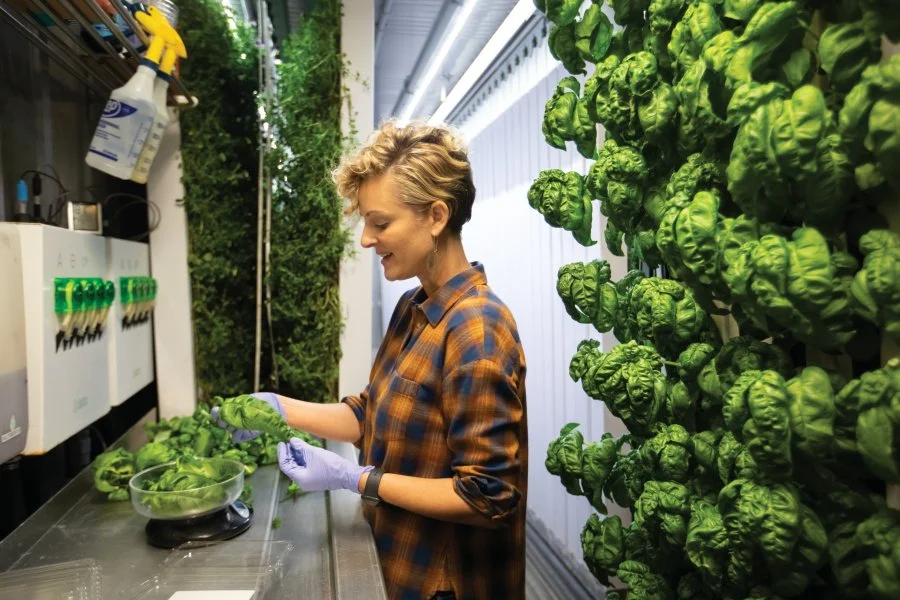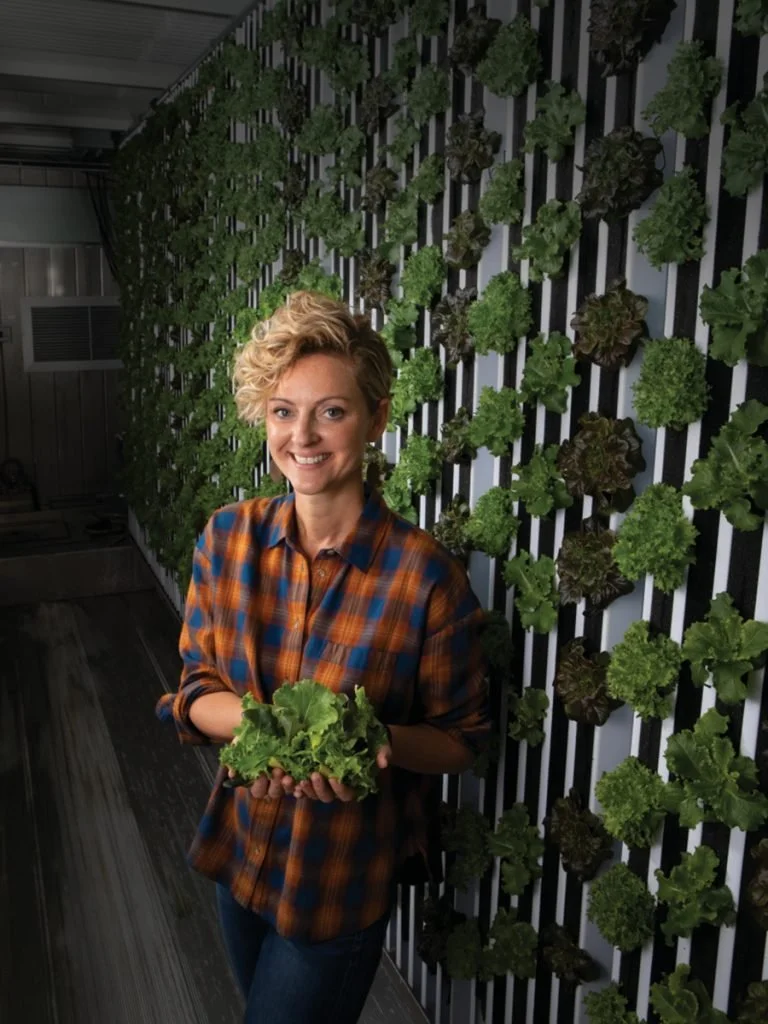Vertical Farms Mean Vegetables Can Grow Anywhere
In partnership with: Michigan Department of Agriculture & Rural Development
Some Michigan farmers take urban agriculture to new heights – literally. Because vertical hydroponic farming combines sustainability, prolificity and nutrition, it might be the upward trajectory for the future of urban farming globally.
Sustainable System
“Farmers today need to grow 70% more fruits and veggies for the world to be able to consume a nutrient-rich diet,” says Jill Frey, owner of Superbloom Farms in Grand Rapids. “That highlights the importance of alternative farming methods.”
In November 2021, she bought a shipping container that had been upcycled for vertical farming and only four months later purchased a second. She raises a mix of salad greens, basil and edible flowers.
Photo credit: Nathan Lambrecht
“We use 95% less water than traditional soil farms. Our urban setting means the costs and carbon footprint of transporting our greens are almost zero,” she says.
New Buffalo’s Artesian Farm, which also produces salad greens and basil, began in 2011 in a reclaimed industrial building. Chief Financial Officer Keith Kudla adds that it uses 98% less land than traditional farming.
How do they achieve that level of sustainability? The answer is in the process. Hydroponic means gardening without soil. Seeds sprout in coco husk or peat moss plugs before being transferred to floats for root systems to be submerged or towers that provide timed water and nutrient delivery. In both methods, specialized light spectrum LED bulbs mimic sunlight for up to 16 hours a day to help the plants mature, and specific nutrients in precise amounts are added to filtered water.
“The water is constantly recycled and repopulated with nutrients in our closed loop system,” Frey says.
Kudla says he was amazed to learn the water used at Artesian Farm, after purification and before the addition of nutrients, doesn’t conduct electricity, which means it’s free of chemicals and contaminants such as E. coli.
“We grow the equivalent of 8 acres of produce with less water than it takes to water my one-eighth of an acre lawn,” he says.
Pesticides and herbicides are also unnecessary in the light- and climate-controlled setting.
Photo credit: Nathan Lambrecht
Prolific Plants
Climate control contributes significantly to vertical farming’s prolificity.
“We can offer you lettuce and herbs year round, with no interruptions,” Frey says.
A 340-square-foot shipping container produces a yield equivalent to 2 to 4 acres of farmland, or more than 6,000 pounds of leafy greens per year.
Kudla says Artesian Farm’s reclaimed industrial building accommodates seven vertical layers simultaneously. “We harvest our lettuce about 17 times per year. At the same time, a traditional farmer gets one or two harvests,” he says.
Vertical farming allows for greater product freshness with delivery to clients typically the same day as harvest. Photo credit: Nathan Lambrecht
Nutritious Nature
With specific nutrients delivered via water, the greens are likewise full of nutrients.
“Superbloom Farms uses non-GMO seed, so the greens you get from us are packed only with nutrients – no chemicals,” Frey says.
Both farmers say the hyperlocal urban nature of the vertical farms allows for greater product freshness, and both typically deliver to grocery and restaurant clients the same day as harvest.
Photo credit: Nathan Lambrecht
“Traditionally, produce is hauled from thousands of miles away and spends a week in a tractor-trailer, but ours is on the shelf in a matter of hours,” Kudla says. Frey agrees. “It will last longer in your fridge, stay fresher and you don’t have to worry about it going to waste,” she says.
Hydroponic vertical farm-grown produce has a reputation for safety, too. The U.S. Department of Agriculture has issued a recall only once on produce traced to such a facility.
Such characteristics mean vertical farming can provide fresh, nutritious, cost-competitive produce to any community anywhere in the world, Kudla says.
To learn more about these vertical farms, visit superbloomfarms.com and artesianfarms.com.
Lead Photo: Jill Frey, owner of Superbloom Farms in Grand Rapids, grows a mix of salad greens, basil and edible flowers in shipping containers. Photo credit: Nathan Lambrecht
Crops & Livestock, Farm, Michigan, Michigan Crops & Livestock, Michigan Farm to Table






